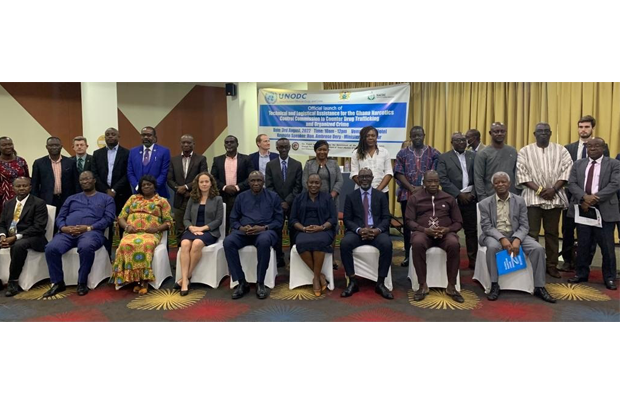The participants at the event
MINISTER OF the Interior, Ambrose Dery, has called for timely information and intelligence sharing among state agencies in the fight against illicit drug trafficking and organised crime.
According to Mr. Dery, this is critical to the successful seizure of contraband goods and the arrest of perpetrators.
“The fight against such unlawful acts can further be strengthened through partnerships and collaborations. The ultimate goal of arrest is to secure successful prosecution leading to conviction. We can only achieve that when we collaborate and work together,” he added.
The sector minister made the call at the launch of the Technical and Logistical Assistance Project for Ghanaian authorities to counter drug trafficking and organised crime.
The US$1.5million project being implemented by the United Nations Office on Drugs and Crime (UNODC), in partnership with Narcotics Control Commission (NACOC) would last for 30 months.
Under the project, a digital library would be created for the commission to enhance intelligence and document management.
There will be training sessions for the improvement of knowledge and skills of officers while encouraging organisational culture that respects human rights and the rule of law.
Also, it would facilitate information sharing, and a culture of partnership between NACOC and the Ghana Police Service, particularly the CID Drug Law Enforcement Unit (DLEU).
Mr. Dery said the launch of the project is testament to the international community’s commitment to collaborate, strengthen and help to dismantle international drug syndicates and organised crime institutions in Ghana and Africa.
He said in most cases, money gotten from illicit drug trade is used to finance other illegal activities across the world, including violent extremism.
The minister stressed the importance of protecting the youth from being involved in the unlawful act, adding that, “if we lose them to the use of drugs, it will cause a problem.”
Regional Director, West and Central Africa, UNODC, Dr. Amado Philip De Andres, said West Africa was a region vulnerable to and affected by acute threats in terms of transnational organised crime, including the use of the region as a transit area for cocaine, heroin, and cannabis.
He added that, “We are working together to provide effective and balanced drug control solutions to protect health and livelihood, as highlighted in the Investment Area 1 of the UNODC Strategic Vision for Africa 2030.”
Mr. Amado said the partnership between UNODC and NACOC, with guidance from the US Department of States’ Bureau of International Narcotics and Law Enforcement Affairs (US INL), was to support the National Integrated Programme (NIP) to fight transnational organised crime and to strengthen the criminal justice system in Ghana.
He said the launch would pave way for the establishment of a minimum of five border posts, among others, for NACOC to expand its coverage in the fight against illicit drug trafficking.
“The first batch of 30 senior officers from Oti Region, Ashanti Region and Greater Accra, have been selected for an intensive Trainer of Trainers Course at the end of August 2022 to ensure sustainability of the project,” he added.
Acting Director-General, NACOC Mr. Kenneth Adu- Amanfoh, said the Commission was committed to collaborating with their development partners to develop professional enhancement training programmes to combat illicit drug trade.
“The commission also hopes to use this platform to advocate for stakeholders support in the fight against drug trafficking and organised crime, as well as to start a discussion about the dangers of narcotic drugs and how to address them,” he added.
By Jamila Akweley Okertchiri

